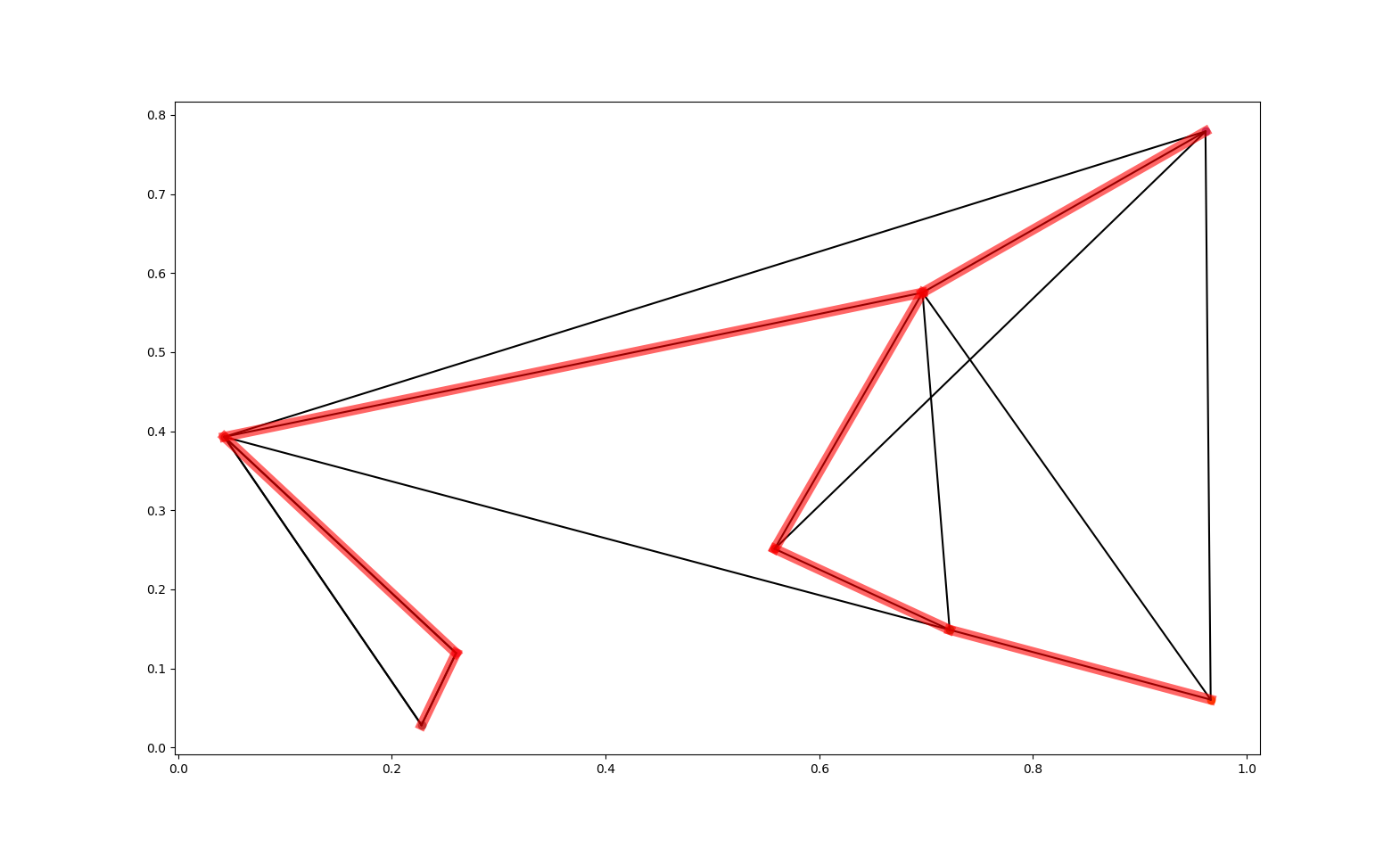
2

【最小生成树问题】Prim和Kruskal
source link: https://www.guofei.site/2017/09/12/minimumspanningtree.html
Go to the source link to view the article. You can view the picture content, updated content and better typesetting reading experience. If the link is broken, please click the button below to view the snapshot at that time.
【最小生成树问题】Prim和Kruskal
2017年09月12日Author: Guofei
文章归类: 8-数据结构与算法 ,文章编号: 530
版权声明:本文作者是郭飞。转载随意,但需要标明原文链接,并通知本人
原文链接:https://www.guofei.site/2017/09/12/minimumspanningtree.html
问题介绍
最小生成树问题(Minimum Spanning Tree Problem)是贪心算法中的一个著名问题。
- 什么是最小生成树?
最小生成树的定义,见于另一篇博客 - 有哪些经典算法?Prim算法和Kruskal算法,他们的算法复杂度都是O(mlnn)O(mlnn)
Python实现:Kruskal算法朴素版
step1:Kruskal
def naive_find(C, u):
while C[u] != u:
u = C[u]
return u
def naive_union(C, u, v):
u = naive_find(C, u)
v = naive_find(C, v)
C[u] = v
def naive_kruskal(G):
E = [(G[u][v], u, v) for u in G for v in G[u]]
T = set()
C = {u: u for u in G}
for _, u, v in sorted(E):
if naive_find(C, u) != naive_find(C, v):
T.add((u, v))
naive_union(C, u, v)
return T
step2:生成源数据
a, b, c, d, e, f, g, h = range(8)
G = {
a: {b, c, d, e, f},
b: {c, e},
c: {d},
d: {e},
e: {f},
f: {c, g, h},
g: {f, h},
h: {f, g}
}
from scipy.stats import uniform
rv = uniform(loc=0, scale=1)
V = {i: rv.rvs(size=2) for i in range(8)}
step3:处理源数据
根据顶点位置,计算每个边的长度
import numpy as np
G = {u: {v: np.linalg.norm(V[u] - V[v], ord=2) for v in G[u]} for u in G}
处理后的G是这样的:
{0: {1: 0.64350318067251699,
2: 0.32295401183865463,
3: 0.51010160179841613,
4: 0.45295616601832445,
5: 0.34598888219525081},
1: {2: 0.5987237463745575, 4: 0.19677045227515677},
2: {3: 0.36425593157427333},
3: {4: 0.23395295642549108},
4: {5: 0.7416922814813679},
5: {2: 0.64835524727633864, 6: 0.99210311952923735, 7: 0.82003926434628127},
6: {5: 0.99210311952923735, 7: 0.22362975308802449},
7: {5: 0.82003926434628127, 6: 0.22362975308802449}}
(用dict嵌套dict来)
调用Kruskal算法并作图
k = naive_kruskal(G)
from scipy.stats import uniform
import matplotlib.pyplot as plt
for i in V:
plt.plot(V[i][0], V[i][1], 'o')
for i in G:
for j in G[i]:
temp = list(zip(V[i], V[j]))
plt.plot(temp[0], temp[1], 'k')
for i in k:
temp = list(zip(V[i[0]], V[i[1]]))
plt.plot(temp[0], temp[1], 'r', lw=8, alpha=0.6)
plt.show()
结果:(点是随机生成的,所以每次运行图未必一样)
Python实现:Kruskal算法改进版
def find(C, u):
if C[u] != u:
C[u] = find(C, C[u])
return C[u]
def union(C, R, u, v):
u, v = find(C, u), find(C, v)
if R[u] > R[v]:
C[v] = u
else:
C[u] = v
if R[u] == R[v]:
R[v] += 1
def kruskal(G):
E = [(G[u][v], u, v) for u in G for v in G[u]]
T = set()
C, R = {u: u for u in G}, {u: 0 for u in G}
for _, u, v in sorted(E):
if find(C, u) != find(C, v):
T.add((u, v))
union(C, R, u, v)
return T
a, b, c, d, e, f, g, h = range(8)
G = {
a: {b, c, d, e, f},
b: {c, e},
c: {d},
d: {e},
e: {f},
f: {c, g, h},
g: {f, h},
h: {f, g}
}
from scipy.stats import uniform
rv = uniform(loc=0, scale=1)
V = {i: rv.rvs(size=2) for i in range(8)}
import numpy as np
G = {u: {v: np.linalg.norm(V[u] - V[v], ord=2) for v in G[u]} for u in G}
k = kruskal(G)
from scipy.stats import uniform
import matplotlib.pyplot as plt
for i in V:
plt.plot(V[i][0], V[i][1], 'o')
for i in G:
for j in G[i]:
temp = list(zip(V[i], V[j]))
plt.plot(temp[0], temp[1], 'k')
for i in k:
temp = list(zip(V[i[0]], V[i[1]]))
plt.plot(temp[0], temp[1], 'r', lw=8, alpha=0.6)
plt.show()
Python实现prim算法
from heapq import heappop, heappush
def prim(G, s):
P, Q = {}, [(0, None, s)]
while Q:
_, p, u = heappop(Q)
if u in P: continue
P[u] = p
for v, w in G[u].items():
heappush(Q, (w, u, v))
return P
参考资料:
http://www.cnblogs.com/biyeymyhjob/archive/2012/07/30/2615542.html(原文的图表很详细)
Python算法教程
《Python算法教程》[挪威]Magnus Lie Hetland
您的支持将鼓励我继续创作!
Recommend
About Joyk
Aggregate valuable and interesting links.
Joyk means Joy of geeK